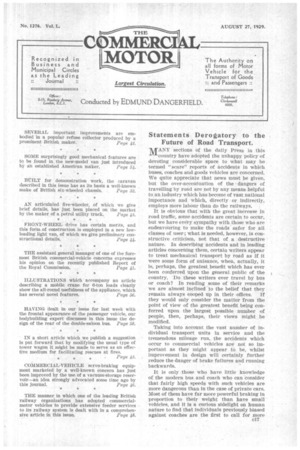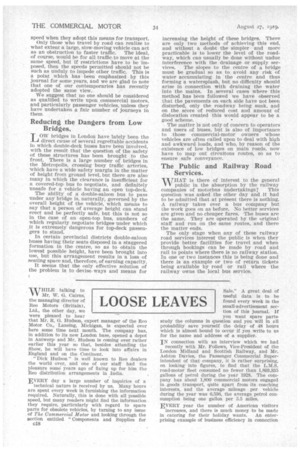Statements Derogatory to the Future of Road Transport.
Page 39

Page 40

If you've noticed an error in this article please click here to report it so we can fix it.
MANY sections of the daily Press in this 13-I-country have adopted the unhappy policy of devoting considerable space to what may be termed "scare" reports of accidents in which buses, coaches and goods vehicles are concerned. We quite appreciate that news must be given, but the over-accentuation of the dangers of travelling by road are not by any means helpful to an industry which has become of vast national importance and which, directly or indirectly, employs more labour than do the railways.
It is obvious that with the great increase in road traffic, some accidents are certain to occur, but we have every sympathy with ,those who are endeavouring to make the roads safer for all classes of user-; what is needed, however, is constructive criticism, not that of a destructive nature. In describing accidents and in leading articles concerning them, certain writers appear to treat mechanical transport by road as if it were some form of nuisance, when, actually, it is, perhaps, the greatest benefit which has ever been conferred upon the general public of the country. Do these writers ever travel by bus or coach? In reading some of their remarks we are almost inclined to the belief that they remain always cooped up in their offices. If they would only consider the matter from the point of 'View of the greatest benefit being conferred upon the largest possible number of people, then, perhaps, their views might be modified.
Taking into account the vast number of individual transport units in service and the tremendous mileage run, the accidents which occur to commercial vehicles are not so important as they might appear to be, whilst improvement in design will certainly further reduce the danger of brake failures and running backwards.
It is only -those who have little knowledge of the modern bus and coach who can 'consider that fairly high speeds with such vehicles are more dangerous than in the case of private cars. Most of them have far more powerful braking in proportion to their weight than have small vehicles, and it is a curious sidelight on human nature to find that Individuals previously biased against coaches are the first to call for more
speed when they adopt this means for transport. Only those who travel by road can realize to what extent a large, slow-moving vehicle can act as an obstruction to faster traffic. The ideal, of course, would be for all traffic. to move at the same speed, but If restrictions have to be imposed, then the speeds permitted should not be such as unduly to impede other traffic. This is a point which has been emphasized by this journal for some years, and we are glad to note that one of our contemporaries has recently adopted the same view.
We suggest that no one should be considered as qualified to write upon commercial motors, and particularly passenger .Vehicles, unless they have undertaken a fair number of journeys in them.












































































































